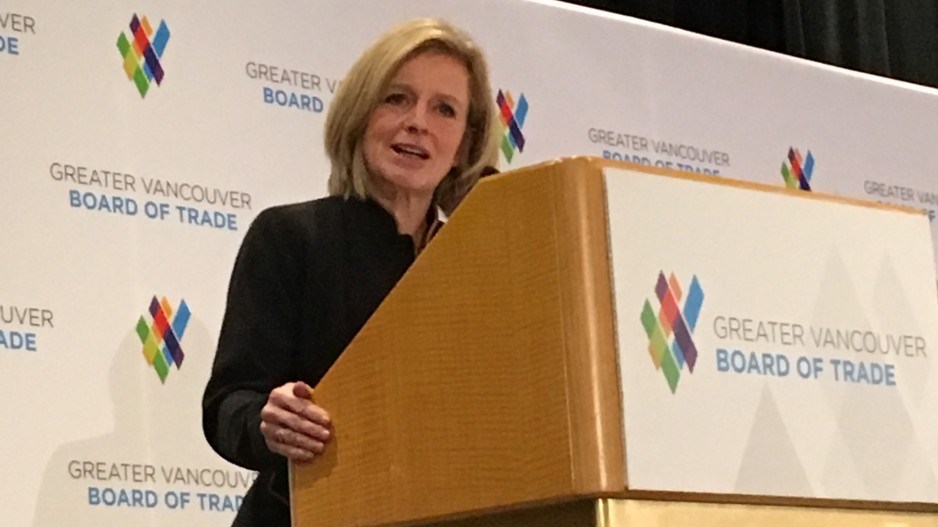The B.C. government has filed a court challenge of the new Alberta law that could be used to cut off oil and or gasoline to B.C.
And while B.C. attorney general David Eby said he doesn’t think Alberta has the legal authority to use the new law to throttle B.C.’s fuel supply, he confirmed that B.C. is looking to other suppliers outside of Alberta in the event B.C. were to suddenly find itself cut off from Alberta oil and gas.
“The government is looking for alternate sources of refined products to ensure that harm in British Columbia is minimized, if Alberta attempts to use this and we’re unsuccessful in an injunction application,” he said at a press conference Tuesday May 22.
Eby was speaking to a claim that B.C. filed today in Court of Queen’s Bench in Alberta. B.C. is asking the Alberta court for a declaration that Alberta’s Bill 12 is “inconsistent, in whole or in part, with the Constitution of Canada and is of no force and effect.”
Bill 12 received royal assent on May 18. It would use licensing to control the exports of oil and refined fuel products. Alberta Premier Rachel Notley and other Alberta cabinet ministers have made it clear that the law is directly aimed at B.C., and is a response to the B.C. government’s attempts to halt the $7.4 billion Trans Mountain pipeline expansion from moving ahead.
‘“It’s very interesting,” Notley said at a press conference that followed Eby's. “On one hand, they don’t want our oil, and on the other hand they are suing us to give them our oil.”
She referred to the fact that B.C.is also seeking clarification from the BC Court of Appeal on whether it has the constitutional authority to throttle the volume of diluted bitumen from Alberta through B.C.
B.C. initially signaled it would implement restrictions that would keep the flow of dilbit from Alberta on the existing Trans Mountain pipeline, or by rail, at current levels, which would effectively prevent a second line from being built, since its sole purpose is to move dilbit from Alberta to tidewater in Burnaby.
Alberta responded immediately with a boycott on B.C. wines. B.C. backed off somewhat, saying it would first ask the courts to clarify whether or not it has the authority to do so.
But while that was taking place, Kinder Morgan Canada (TSX:KML) announced last month that it was halting all but essential work on the $7.4 billion pipeline twinning project, and gave the governments of Canada and B.C. until May 31 to give it the clarity and certainty it needed. Otherwise, the company said it may cancel the project, rather than put its shareholders at risk.
The federal Liberal government responded to that with a promise to indemnify the project to protect Kinder Morgan shareholders from costly delays.
Ottawa and Alberta are now in talks with Kinder Morgan to try to get some deal in place by May 31. For that reason, Notley said she will not be attending a western premiers conference in Yellowknife Wednesday May 23.
One of the items on this year's conference agenda is a national pharmacare program. While Notley said she would send her deputy minister and health minister, she herself has more important things to attend to at home.
And she underscored the damage that been caused to interprovincial relations over the Trans Mountain pipeline dispute. Saskatchewan Premier Scott Moe, for example, has said his province will adopt laws similar to Alberta's Bill 12, in an effort to block any exports of Saskatchewan oil or gas exports to B.C., while Quebec is supporting B.C. in it fight with Ottawa over constitutional jurisdiction questions.
"When it comes to interprovincial relations, it's not business as usual," Notley said. "Not even close. And that is why I have chosen to not attend the Western Premiers' meeting. My time is better spent here, working with federal government, working with Kinder Morgan, and making sure we get across the finish line before the May 31 deadline."
She added that paying for things like a national pharmacare program requires federal and provincial revenue, and that Alberta is losing billions to pipeline constraints.
"In representing Alberta at that table, we're going to make something very clear," she said. "If we want to make sure that every Canadian can get the medications they need, we need to be able to pay for it.
"So while they are at the premiers' meeting talking about how to spend that kind of money, I'll be here in Alberta trying to figure out how we can earn that kind of money.
"One participant at the Western Premiers' table is working hard to take about $15 billion a year out of the Canadian economy," she said, referring clearly to B.C. Premier John Horgan.
Should B.C. lose its reference case at the BC Court of Appeal level, it could appeal to the Supreme Court of Canada. Since it would end up there anyway, Eby expressed frustration with the federal government, saying he couldn't understand why Ottawa has refused to send the reference question immediately to the Supreme Court of Canada – something the federal government has the power to do, but which the B.C. government does not have the power to do itself.
“We’ve time and again called for the federal government to elevate all legal disputes regarding our draft legislation, Alberta’s new law, to the Supreme Court of Canada to offer certainty, finality and a faster process,” Eby said. “And Canada continues to refuse this request.”



